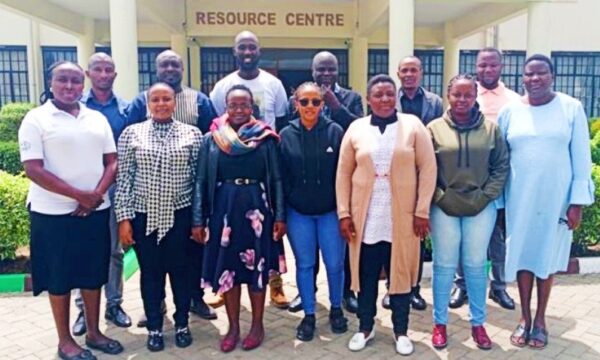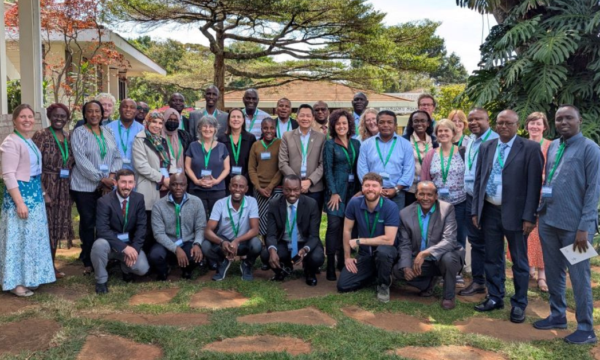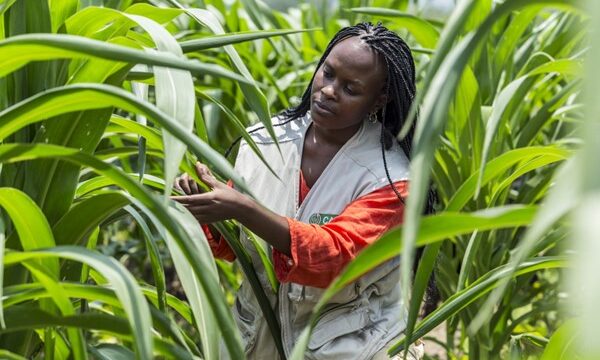
A new CABI study brief has been published which delves into important aspects regarding the effectiveness of farmer groups in advocating for and adopting safe food production standards using experiences from Ghana and Kenya.
The study brief, written by CABI scientists Maureen Njenga, Walter Hevi, Suzanne Neave, Lucy Karanja, Dr Naphis Bitange and Dr Monica Kansiime, presents key insights into the effectiveness of farmer groups in fostering the adoption of safe food production standards.
Their research, entitled ‘Insights into farmer group effectiveness for promoting the adoption of safe food production standards,’ draws upon existing literature and from experiences of working with farmer groups on a production standard in Ghana and Kenya.
Crucial role in safeguarding public health
The adoption of safe food production standards and the related certification systems by farmers play a crucial role in safeguarding public health, environmental integrity and meeting regulatory requirements, the scientists say.
Such production standards consist of a system of activities or functions that must work together to ensure that the best practices represented in the standard are implemented and complied with.
The scientists suggest that farmer groups have emerged as effective platforms for promoting the adoption of safe food production standards, offering collective support, knowledge sharing, and resources to individual farmers.
They evaluate factors that contribute to the success of farmer group initiatives, while also identifying potential challenges faced by such groups and proposing strategies to enhance their effectiveness.
Effectively promote the adoption of food safety standards
Maureen Njenga said, “By offering a comprehensive review, this study brief contributes to a better understanding of how farmer groups can effectively promote the adoption of food safety standards, ultimately improving the overall safety and quality of agricultural products. The lessons learnt from this study may be customized and used in improving existing initiatives in other countries in future.”
The key highlights of the study brief also argue that collective actions within farmer groups can lead to economies of scale in quality control and better access to markets, helping farmers comply with the standards necessary to adopt.
The study brief also contends that to enhance the effectiveness of farmer groups in adopting production standards, it is essential to focus on governance, social interactions, internal regulations, and an internal control system which provides inspection of all farms.
“Government support and policies can further create an enabling environment for farmer groups to thrive and ensure greater good production,” Dr Kansiime said. “Raising consumer awareness about the importance of food safety standards can enhance demand for safer food, further motivating farmer groups to deliver quality products.”
Key challenges faced by farmer groups
She added, however, that addressing the key challenges faced by farmer groups – such as governance, social dynamics, internal controls, and quality management systems, is essential for their effectiveness.
Dr Bitange said, “There is also a need for supportive policies and an enabling environment for farmer groups to adhere to food safety standards effectively.”
The scientists say that farmer groups can be an effective solution to persuade farmers to comply with production standards, by leveraging their collective strength and resources, and enabling appropriate linkages to markets.
They stress, adherence to standards implies the adoption of costlier but less damaging production methods, and extra costs for certification – and, according to this rationale, farmers would need to be paid a higher tariff in compensation.
In 2018, vegetable exports worth $15 million a year in Ghana continued once again after the lifting of a Directorate-General for Health and Food Safety of the European Commission ban imposed in 2015.
This followed work by CABI, in partnership with the Plant Protection and Regulatory Services Directorate (PPRSD) of the Ministry of Food and Agriculture, Ghana, and the Ghana Association of Vegetable Exporters (GAVEX), to improve the country’s phytosanitary systems.
Additional information
Main image: The study brief delves into important aspects regarding the effectiveness of farmer groups in advocating for and adopting safe food production standards (Credit: Pixabay).
Study brief reference
Njenga, M.W., Hevi, W., Neave, S., Karanja, L., Bitange, N. Kansiime, M.K. (2023) Insights into farmer group effectiveness for promoting the adoption of food production standards. CABI Study Brief 46 Learning. DOI: https://dx.doi.org/10.1079/CABICOMM-62-8176
The study brief can be read in full here.
Relevant stories and blog
‘Vegetable exports from Ghana resume after work to improve phytosanitary system.’
‘Working in partnership to increase safe and efficient trade of agriculture in East Africa.’
‘Strengthening Sanitary and Phytosanitary Systems in Burundi: A transformative training experience.’
Related News & Blogs
Strengthening the potato value chain in the Kurdistan Region of Iraq
On 30th May, we marked the International Day of Potato. In this blog, CABI’s Crop Health Advisor Anna Wood provides an update on a five-year project led by CABI to strengthen the potato value chain in the Kurdistan Region of Iraq. An ambitious five-yea…
3 June 2025




